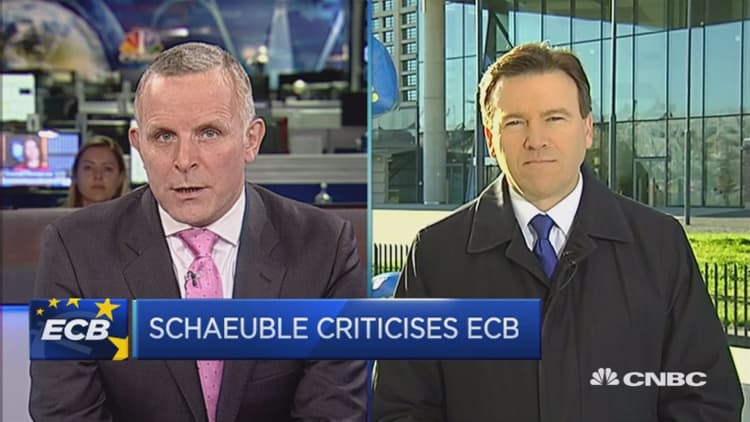
Relations between the European Central Bank (ECB) and Germany's leaders are becoming increasingly strained as differences grow over the increasingly dovish path taken by the central bank.
The criticism in Germany targeted at the ECB and its President, Mario Draghi, has reached fever-pitch since the ECB brought out an even bigger bazooka from its arsenal of monetary policy strategies to try to stimulate growth and inflation in the anemic euro zone. As well as cutting its main interest rates, it expanded its massive bond-buying program to 80 billion euros ($90.3 billion) a month and added corporate bonds into the mix.
The ECB is expected to be far less dramatic when it announces its latest rate decision on Thursday but it is no having to contend with growing criticism from close to home in Germany where officials say its policies are hurting the economy.
Germans revolting
German Finance Minister Wolfgang Schaeuble reiterated his criticism of low interest rates, saying that there was "no question" that zero rates for a long period of time was "not reasonable," Reuters reported, and said that central banks should find a way out of low rates.
Earlier in April, Schaeuble attacked the bank's monetary policy by saying it was causing "extraordinary problems" for Germany and was in part to blame for the rise of the right-wing anti-immigration party Alternative for Germany (AfD), Reuters reported attributing the remarks to Dow Jones.
He also warned that the ECB's ultra-low rates were creating a "gaping hole" in savers' finances and pensioners' plans.
"It is indisputable that the policy of low interest rates is causing extraordinary problems for the banks and the whole financial sector in Germany," he told the news agency on April 12. "That also applies for retirement provisions."
Germany has a traditional antipathy towards low interest rates because its citizens have tended towards cautious saving rather than spending and Germany's economy is still largely export-driven rather than reliant on domestic consumption.
Price stability is also a key part of the psyche of German policymakers with the memory of hyperinflation in Germany's Weimar Republic in the 1930s making officials wary of low interest rates designed to boost inflation to around the ECB's target of below 2 percent. At the last inflation reading in March, the euro zone was again in deflation territory with prices falling 0.1 percent year-on-year.
An unlikely ally
Schaeuble has never been backwards in coming forwards in terms of his criticism of other countries' organizations' policies, but the comments are not likely to sit well with ECB President Mario Draghi. Schaeuble is not the only German to criticize the bank's direction either, with one of the bank's own governing council members consistently critical of its loose monetary policy.
Bundesbank President Jens Weidmann said that last month's ECB stimulus measures went too far, according to comments published by Dow Jones. "All things considered, the decisions for me went too far and the comprehensive package of measures didn't convince me," Weidmann said.
However, it was Weidmann that defended the ECB from criticism from German policymakers, such as Schaeuble, earlier this month, both asserting the ECB's independence and rebuking politicians for attempting to put pressure on Mario Draghi to change the ECB's strategy.
"It's not unusual for politicians to have opinions on monetary policy, but we are independent," Weidmann told the Financial Times earlier in April.
"The ECB has to deliver on its price stability mandate and thus an expansionary monetary policy stance is appropriate at this juncture regardless of different views about specific measures."
The staunch defense of the ECB has raised suspicions that Weidmann could be angling for the top job at the central bank although Draghi's term has a long time to run, expiring in 2019, and a German running a German-based institution could prompt more questions over the bank's independence and impartiality.





